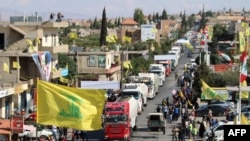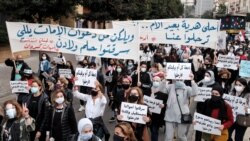On November 11, Hassan Nasrallah, the secretary-general of Lebanon’s Hezbollah party, denied that Iran had any control over Lebanon and his party, calling it the biggest “lie” in the region.
Nasrallah’s comments came in a speech aired on the Al-Manar, the Hezbollah-owned TV channel in Lebanon. While Hezbollah is influential and holds seats in Lebanon’s parliament and positions in the government, it is not an Iranian surrogate or rubber stamp, Nasrallah insisted.
“Are we dominating the [Lebanese] state? This is the biggest lie in Lebanon and the region,” he said. “It is the same lie as the lie of an Iranian occupation. Iran, which allegedly occupies Lebanon, cannot enter a diesel ship on the oil refineries in Lebanon. What is this empty, ridiculous and frivolous talk? Whoever says it, whether Lebanese or Saudi, or whoever he is, this is a flimsy and weak claim.”
But Nasrallah’s comment is misleading, at least when it comes to Iranian oil. While it’s true that ships carrying Iranian fuel haven’t docked in Lebanon, Hezbollah has imported Iranian fuel through Syria, skirting official checkpoints and Lebanese government permission.
And Nasrallah has bragged about it.
Hezbollah is a close Iranian ally and has received Iranian funds and weapons since its inception. As a Shiite Muslim party, it is also aligned with Iran on religion. Hezbollah’s militia has grown in power, becoming what some analysts call “a state within a state.”
The European Union, United States and other countries consider Hezbollah a terrorist group, and several U.S. administrations have targeted it with sanctions. The resulting financial pressure has hit Hezbollah hard, reportedly prompting cuts in pay and social services.
Iran imported Iranian fuel into Lebanon this year, overland through Syria.
In August, Lebanon’s central bank ended domestic fuel subsidies and let the market set prices, which immediately skyrocketed more than 66%. People waited in line for hours – even days – at gas stations to get gasoline. Businesses and hospitals faced closure.
Amid the panic, Nasrallah vowed to import oil from Iran and also said Iran could drill for oil off Lebanon’s coast so that Lebanon would not have to rely on imports.
Days later, the first Iranian ships carrying fuel docked at the Syrian port of Baniyas, offloading their cargo into 80 trucks that carried 4 million liters of fuel into Lebanon. According to Agence France-Presse (AFP), the fuel was purchased by Lebanese businessmen with ties to Hezbollah.
The delivery of the Iranian fuel was not authorized by Lebanon’s government. The trucks entered Lebanon illegally through unofficial border crossings managed by Hezbollah, not those run by the Lebanese state. Baniyas is about a 40-mile drive north of Lebanon’s border with Syria.
The Iranian fuel shipments violated U.S. sanctions imposed on Tehran following former president Donald Trump’s decision in 2018 to withdraw from the Joint Comprehensive Plan of Action (JCPOA) on Iran’s nuclear program.
Lebanon’s government distanced itself from the fuel purchases.
“The Lebanese government did not approve this, no body applied to have this. We don’t deal with this at all so I don’t believe the Lebanese government will be subject to any sanctions,” Lebanese Prime Minister Najib Mikati said on September 19.
After those first deliveries, Nasrallah promised more ships carrying fuel. He warned the United States and Israel not to interfere, describing Iranian tankers as “Lebanese territory.”
In response, former Lebanese Prime Minister Saad Hariri accused Nasrallah of violating the country’s sovereignty. In a tweet, Hariri rejected calling the Iranian ships “Lebanese territory.”
“We will not, under any circumstances, be a cover for projects to drown Lebanon in absurd wars that are hostile to the Arabs and the world,” Hariri said.
The fuel delivered from Iran went to the Hezbollah-controlled area of Baalbek and was stored in gas stations run by the Al Amana fuel company, also sanctioned by the United States.
Nasrallah blames the U.S. sanctions for exacerbating Lebanon’s economic crisis. Lebanese leaders have blamed the fuel crisis on hoarding aimed at spiking fuel prices, as well as the smuggling of fuel into war-torn Syria.
After Lebanon’s 1975-1990 civil war, its government relied on tourism, foreign aid, finance and remittances from Lebanese expatriates to revive the country. Lebanon also received support from the Gulf Arab countries, which helped fund the Lebanese central bank’s reserves.
By 2011, Lebanon’s economy began tanking as neighboring Syria descended into civil war. As the political influence of Iran-backed Hezbollah grew, Sunni Arab countries cut off financial support.
Lebanon’s economic crisis worsened over the last two years, exacerbated by mismanagement and corruption. Punishing inflation, COVID-19 and the deadly Beirut port explosion in August 2020 have left more than half the country’s population in poverty.
Hezbollah became involved in Lebanese politics in 1992, when it won eight seats in the country’s parliament. Since 2005, the group has held Cabinet positions, and in 2018 it won 12 seats in parliament. Hezbollah and its allies combined secured 71 of the parliament’s 128 seats which the party declared as a “victory.”
In addition to maintaining a military wing, Hezbollah runs a wide network of social services, food programs and health care centers that have attracted support from Shiite and non-Shiite Lebanese.

